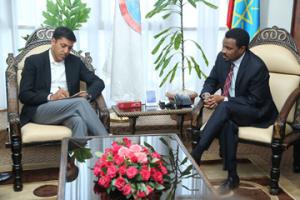Building on the Rockefeller Foundation’s deep commitment to Ethiopia, President of the Foundation Dr. Rajiv J. Shah makes first visit to the country.
Dr. Rajiv J. Shah took the helm of The Rockefeller Foundation on March 1, 2017 prioritizing visiting East Africa as part of his first international trip in his new role. With stops in Kenya, Uganda, and Ethiopia he met with heads of state, business leaders, and Foundation grantees.
“Dr. Shah looks forward to learning how the Foundation can best contribute to continued economic opportunity,” the Foundation said in a statement noting that he also plans to foster human rights and dignity under his leadership and in service of The Rockefeller Foundation’s mission: to improve the well-being of humanity.”
Building on a Long and Strong History
Rockefeller Foundation support to Ethiopia has focused on agriculture. In the 1960s, the Foundation together was a leader in creating the Consultative Group on International Agricultural Research (CGIAR), which includes the Ethiopia-based International Livestock Centre for Africa. Most recently, investments have been in demonstrating a resilient approach to agriculture, and lessons from Ethiopia have informed positive changes across the continent. Over the past two years, the Foundation-supported 100 Resilient Cities effort welcomed Addis Ababa into its global network, bringing new resources and thinking in support of the city and its forward-looking vision. Ethiopia is also host to an innovative Roads for Resilience project, supported by the Global Resilience Partnership which the Foundation co-launched with USAID under Dr. Shah’s leadership.
Resilience
Resilience-building – supporting individuals, communities, organizations, and systems to survive, adapt, and grow in the face of shocks and stresses – has been a recent priority of The Rockefeller Foundation, and we have invested more than $500 million in such efforts over the past decade. Ethiopia has been an exemplar in more than one way, with results that include:
- The HARITA project, an integrated risk management scheme developed by the Relief Society of Tigray and Oxfam America, that supported farmers in strengthening their food and income security through a combination of improved resource management, crop insurance, microcredit, and savings. The poorest farmers were eligible to pay for insurance with their labor through resilience-building projects in their communities. HARITA’s success led to Oxfam and the World Food Programme’s R4 Rural Resilience Initiative, which in Senegal and Ethiopia helps poor rural communities to improve their management of risk as climate shifts threaten their crops and livestock, ensuring that poor farmers have access to insurance.
- The innovative Roads for Resilience Project uses paved roads as a critical water collection resource in regions experiencing chronic droughts and freshwater shortages. This project has won two international awards for its design and the multiple benefits it brings to communities – in addition to an improved road, flood waters are spread to enhance soil moisture and to recharge groundwater, as well as to culverts for irrigation.
- Addis Ababa was recently named to the 100 Resilient Cities network, a global, resilience-building effort pioneered by The Rockefeller Foundation. As part of the network, Addis Ababa receives support to hire a Chief Resilience Officer, develop a forward-looking resilience strategy, and has access to the services of nearly 100 companies and organizations offering guidance to network cities.
Agriculture
While The Foundation’s investments in agriculture in Ethiopia go back decades, more recently, in addition to HARITA, support for the Alliance for a Green Revolution in Africa (AGRA) – which Dr. Shah helped co-launch with The Rockefeller Foundation when he was based at the Bill & Melinda Gates Foundation – has resulted in AGRA directing more than $15.3 million in investments and interventions over the past decade. This has led to a number of impressive results including:
- The development and release of improved seed varieties.
- Training scientists at the Ethiopian Institute of Agricultural Research (EIAR) in crop breeding, establishing local seed companies and agro dealerships, and collaborating with government to put in place policies that favor agricultural development.
- Working closely with the Ministry of Agriculture and Ethiopia’s Agricultural Transformation Agency to develop fertilizer advisory services and to create public and private seed companies

